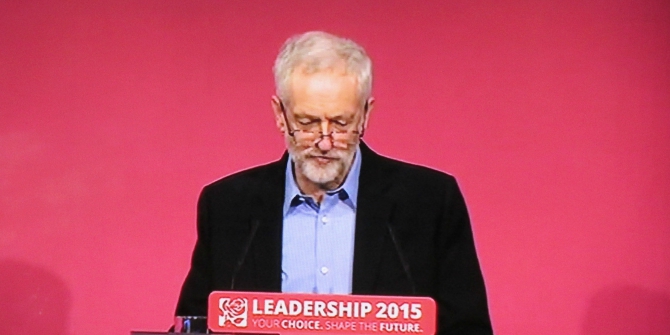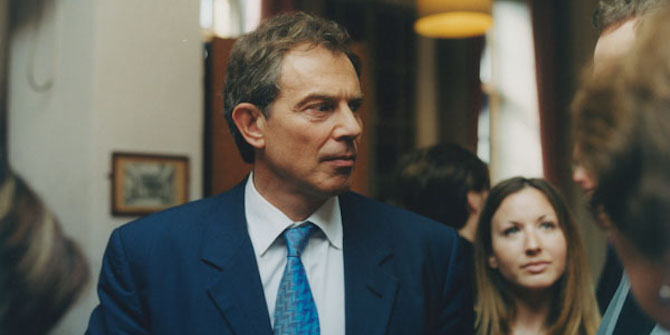 Pippa Catterall writes that Boris Johnson knew exactly what he was doing when he picked up far-right conspiracy theories and flung them at Keir Starmer. She explains why many Tory MPs may nevertheless hesitate to act against him, despite their personal opposition to such tactics.
Pippa Catterall writes that Boris Johnson knew exactly what he was doing when he picked up far-right conspiracy theories and flung them at Keir Starmer. She explains why many Tory MPs may nevertheless hesitate to act against him, despite their personal opposition to such tactics.
This year marks the centenary of the murder of Boris Johnson’s great-grandfather during the dying days of the Ottoman empire. On 4 November 1922 Ali Kemal was abducted by a group of Turkish nationalist army officers from a barber’s shop in Istanbul. Two days later he was brutally beaten to death.
With such an episode in his family history, Johnson might be expected to be more concerned about the consequences of whipping up the kind of hatred vented at Keir Starmer outside Parliament on 7 February. Yet this does not appear to be the case. Opposition to the attacks on the poor, refugees, democracy, and the rule of law conducted by Johnson’s regime is vocal but hardly sanguinary. Johnson can therefore calculate that voicing the fears and hostilities of those who mobbed Starmer is, for him, consequence free. It might even have benefit of diverting attention from his own difficulties over ‘partygate’ and the Sue Grey report.
Johnson’s reputation is tarnished by such episodes and the culture of deceit surrounding him they reveal. Yet, in an age when large swathes of the electorate are deeply cynical about politicians, this does not seem to matter as much as it should. Indeed, it creates a situation in which Johnson does not have to achieve the probably impossible task of instilling public trust in him. He merely has to drag others down to his level. By his slurs about Starmer, he aims to do exactly that.
Since Johnson’s words are therefore deliberate, he has no intention of apologising for them. He knows precisely what he was doing when he picked up conspiracy theories spun by far-right websites and, under cover of parliamentary privilege, flung them at the Leader of the Opposition. As Tory MPs have attested, these falsehoods are also coming up on doorsteps in their constituencies. They therefore provide useful ammunition for a government with so little positive to show for its period in power that it has to base its electoral support on a coalition of anxieties and discontents.
Even if, in the unlikely event that Johnson wanted to apologise, he dare not withdraw the calumnies thrown at Starmer. To do so would be to admit that these accusations are not true. Such an admission would probably not disabuse those who draw comfort from such conspiracy theories. It could, however, reduce their willingness to see Johnson and the Tories as voicing their attitudes.
Many Tory MPs will therefore no doubt persuade themselves to swallow Jacob Rees-Mogg’s line that Johnson’s slurs were simply part of the cut and thrust of party politics. If so, it is clearly a politics in which you play the player not the ball. This is a politics of petty personal insults not of policies, reducing public debate to the puerilities of the playground.
Such considerations are unlikely to weigh heavily with many Tory MPs. Certainly not with enough of them to boost the number calling for a vote of no confidence in Johnson’s leadership of their party up to the magic number of 54. One reason is that there is no clear successor, as there was the last time the Tory tribe carried out a political assassination in 2019. Additionally, many Tory MPs are reluctant to admit, just two and a half years and a triumphant election later, that they could have got their choice then so wrong. And, without an obvious choice now, the risk of getting it wrong again is even greater. Better the devil you know than a leap into the unknown with a new leader who may also be foisted on them by the party membership.
These Tory MPs are the only people who appear to have the power oust Johnson. Yet doing so is fraught with uncertainties and potential downsides for them. Ousting Johnson might not only usher in a bruising leadership contest. There’s also the consideration that Johnson has made it abundantly clear that, unlike Theresa May, he will not go quietly. Nor is he likely to play an elder statesman role if returned to the backbenches. Johnson is much more likely to be a disruptive leader of malcontents, as he was under his predecessor.
In these unpromising circumstances, Tory MPs may well hesitate to act against Johnson. Indeed, they might instead calculate that, if he sits tight, he could ride out the current mid-term unpopularity. In any case, alternative options do not conspicuously appear better. The partial publication of the Grey Report has not changed this calculation. Nor, in all probability, will its full publication, if this ever happens.
There remain other possible scenarios. Grey’s report has no legal force. The police investigations it has triggered do. Yet these are not likely to result in a major prosecution sufficient to justify Johnson’s removal from office. Furthermore, Johnson is no doubt hoping that the relaxation of COVID-19 rules from 21 February will dissipate the public anger over ‘partygate’.
Some senior Tories have suggested to me that electoral calculations are likely to prove more important. If, as they suspect, the current cost-of-living problems lead the Conservatives to do badly in May’s local elections, then more Tory MPs might be motivated by self-preservation to move against Johnson. Already Tory candidates in local by-elections are running under the label ‘Local Conservatives’ to escape contagion by Johnson’s damaged brand.
Yet the same calculations of downsides will still apply. It is possible that more Tory MPs might decide after May that the winner of 2019 is now irredeemably a loser, but by no means probable. This situation could change if the trickle of Tory donors who have pulled funding over the lack of direction under Johnson becomes a flood. Currently, this also is by no means certain.
Rumours of Johnson’s impending political demise appear premature. There remains a strong possibility that he will reach the centenary date of his great-grandfather’s murder still in post and still unrepentantly mudslinging at political opponents. If he does, however, the Conservative Party collectively will have enabled this descent into the political gutter. Their reputation, like that of the moribund Ottoman empire Ali Kemal unavailingly sought to prop up, will ultimately be the loser.
___________________
 Pippa Catterall is Professor of History and Policy at the University of Westminster.
Pippa Catterall is Professor of History and Policy at the University of Westminster.
Photo by Annie Spratt on Unsplash.







